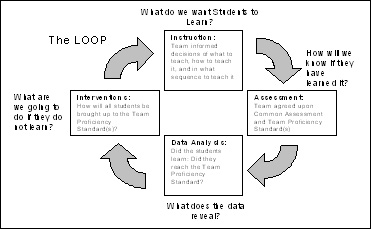|
Research
Summary
Henry Higgins High School became interested in the
notion of professional learning communities as a
means of increasing levels of learning for a highly
diverse population of over 1,300 students. Faced
with increasing accountability demands and a desire
to improve, the staff at Higgins voted to change
the school schedule at the start of the 2003-04
school year in ways designed to provide more time
for staff and student learning. Those structural
changes have led to new learning that has resulted
in an approach that reflects Higgins’ conception
of a professional learning community. The research
team, composed of an administrator and two teacher
leaders, explored the impact of the school’s approach
to building a professional learning community on
learning for both students and teachers.
Our research question asks:
How has Higgins’ professional learning community’s
focus on the LOOP, our systematic approach to learning,
impacted on learning for all as evidenced by high
stakes testing results and local assessments?
- The research question is addressed by presenting
the following information:
- The research base for professional learning
communities
- The Henry Higgins High School approach to professional
learning communities which we have labeled the
LOOP
- Two examples of how the LOOP has impacted on
learning
- Findings and conclusion based on the two LOOP
examples
After a focused literature review of the relevant
research that has led to conceptions of professional
learning communities (PLC), the researchers detail
the Higgins’ definition of a PLC that describes
the way students and school staff come together
to learn. At regular and frequent meetings, the
staff interactively reflects on their work with
students, assesses its value in meeting student
learning goals, and identifies strengths and weaknesses
in both student learning and their own learning.
Borrowing from the work of the Eaker, DuFour, and
Burnette (2002), Higgins constructed a graphic called
the LOOP that systematically addresses four key
learning questions: What do we want students to
learn? How will we know if they have learned it?
What does the data reveal? What are we going to
do if they do not learn?

Using the LOOP, Higgins High School staff has discovered
that they are in the midst of a journey that departs
from traditional schooling practices in two fundamental
ways. First, Higgins is in a process that calls
for new norms of learning, and particularly for
new norms of school staff learning. Secondly, Higgins
staff proposes collaboration as the chief means
to accomplish the goals of the learning community.
The researchers present data collected over a
three year period addressing student remediation
needs for high-stakes Standards of Learning (SOL)
testing, a requirement for graduation in the commonwealth
of Virginia. Additionally, the researchers present
data collected during the 2004-2005 school year
from one English 9 curriculum team that focused
on a school wide goal to increase student proficiency
in non-fiction writing. Based on their data, the
researchers present findings in three interrelated
areas: teacher collaboration, process orientation,
and assessment of learning.
Teacher Collaboration
- Common understanding among team members is
necessary for clear communication of expectations
to students.
- Collaborative decision making among team members
results in increased success for students.
- Effective collaboration comes from a systematic
approach to learning, an approach that addresses
all the key elements of learning and such collaboration
leads to a cultural shift for faculty learning.
Process Orientation
- Learning should not be an accident; it should
be determined, assessed, and revisited through
a systematic approach such as the LOOP.
- Increasing the frequency of movement through
the LOOP increases student achievement.
- Teachers need structured time to move through
the LOOP.
Assessment of Learning
- Curriculum teaching decisions based on real
data lead to informed and strategic improvement
in teaching AND in learning for both teachers
and students. Thus, data analysis should drive
teaching decisions and improvement efforts.
The researchers make
three broad policy recommendations as a result of
their research in using the LOOP to focus efforts
and improve student achievement in both high-stakes
standardized assessments and local assessments.
First, provide the time for teachers to plan instruction,
create common assessments, and analyze the results together. Secondly, provide a systematic
approach that addresses all key learning questions,
so that teachers maintain awareness of and devote
the time to addressing each question. Finally, find
ways to articulate the learning that the multiple
LOOPs represent to a wider audience; the difficulty
in articulating the professional learning community
concepts that underpin the Henry Higgins High School
LOOP must be overcome if the thinking, and the learning
cultural shift, is to become transparent. The notion
that teachers must continually learn how to teach
their students, a notion at the very heart of a
professional learning community, is one not readily
accepted by many teachers and administrators nor
by the public. Yet, as the LOOP teaches, educators
must constantly examine teaching and learning as
it impacts an ever-changing student population.
Only through this examination and a willingness
to adjust teaching can all students truly learn.
|